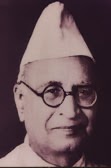29 November 1869
Birth of social worker Thakkar Bapa.
What happened?
In this article, you can read about the life and contributions of eminent social worker, Thakkar Bapa. This will give you material for social issues and essay papers of the UPSC exam.

On 29 November 1869, social worker Amritlal Vithaldas Thakkar, known to his admirers as Thakkar Bapa was born in Bhavnagar, then a princely state in present-day Gujarat.
Thakkar Bapa
- Born to a middle-class family, Thakkar was given his primary education at Bhavnagar and Dholera.
- In 1886, he secured the topmost rank in the matriculation exam in Bhavnagar and was given the Jashvantsinhji Scholarship.
- He then joined the Engineering College, Poona in 1887 and passed out with an L.C.E. (Licentiate of Civil Engineering – today’s graduate in civil engineering) in 1890.
- He worked as an engineer in Porbander and also in Uganda. He was also the Chief Engineer of Sangli State for some time.
- One year after joining the Sangli State, he took up a job with the Bombay Municipality. He was posted at the Bombay suburb of Kurla where he came in touch with “untouchables”. He was shocked to see the miserable conditions in which they lived.
- Thakkar established a school for the children of the sweepers of Kurla with help from Ramaji Shinde, a member of the Depressed Classes Mission.
- In 1914, he joined the Servants of India Society.
- He met Mahatma Gandhi introduced by Gopal Krishna Gokhale and the two developed a close relationship.
- He carried out several relief works for floods and famines.
- He implemented several schemes for making the sweepers free of debts.
- In 1920, he visited Orissa and conducted famine relief work.
- In 1922, the Bhils faced a severe famine. He was deeply moved by the pathetic plight of the tribals and in 1923, he founded the Bhil Seva Mandal to strive for their upliftment.
- He was president of the Bhavnagar State Subjects’ Conference in 1926 and in 1928 he presided over the Kathiwad States People’s Conference.
- During the civil disobedience movement of 1930, Thakkar was arrested and sentenced to 6 months prison with hard labour. But he was released after 40 days.
- He was made the Secretary of the Harijan Sevak Sangh. He founded the Gond Sevak Sangh in 1944. This organisation was later renamed Vanavasi Seva Mandal.
- He was elected to the Constituent Assembly after independence. He was the Chairman of the Excluded and Partially Excluded Areas (other than Assam) Sub-Committee of the Constituent Assembly and also served as a member of the Sub-Committee for Assam.
- Thakkar had a firm faith in universal compulsory education and also advocated the abolition of untouchability. He travelled to many parts of India carrying his mission everywhere.
- He had authored the book ‘Tribes of India’ which was published in 1950.
- He was such a devoted servant of the poor that Mahatma Gandhi once remarked that his ambition was to equal Thakkar Bapa’s record of selfless service.
- He passed away on 20 January 1951 aged 81.
- In 1969, India Post released a stamp in his honour.
Also on this day
1612: The first day of the Battle of Swally (Suvali near Surat) between the Portuguese
and the English which ended Portuguese monopoly on Indian trade and paved the way
for the English to gradually establish in India.
1993: Death of eminent industrialist and aviator J R D Tata.
See previous ‘This Day in History’ here.
Also read the biographies of:
| Usha Mehta |
| Vinoba Bhave |
| Kamaladevi Chattopadhyay |
Comments